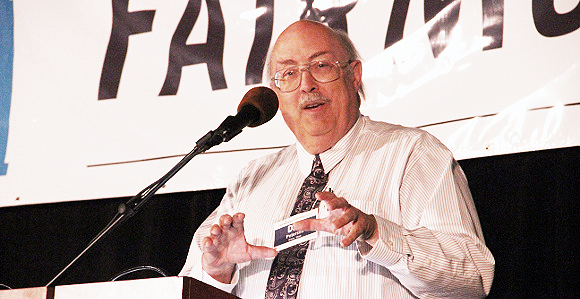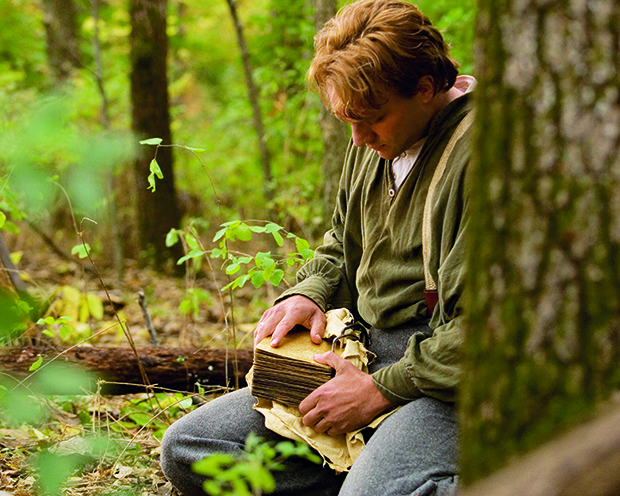Speaker at FairMormon Conference Gives Secular Argument for the Gospel
Contributed By R. Scott Lloyd, Church News staff writer

Daniel C. Peterson speaks August 7 at the FairMormon Conference on the idea that a rational argument can be made for the gospel.
Article Highlights
- There are many circumstances that make it reasonable that Joseph Smith really did have a vision and really did have the plates.
- Witnesses saw these plates and testified that they were real, and gold of that amount was hard to fake or come by at that time.
- Testimony comes through the Spirit and not secular thinking, but members need not claim that the gospel is irrational.
“There are arguments that can be made for the rationality of the gospel, of belief in God, in Christianity, and specifically in Mormonism.” —Daniel C. Peterson, professor of Islamic studies and Arabic at BYU
Related Links
PROVO, UTAH
Belief in the truth of the restored gospel is neither illogical nor irrational, a speaker at the FairMormon Conference declared August 7.
Daniel C. Peterson, a professor of Islamic studies and Arabic at BYU and a frequent defender of the Church, was the closing speaker at the two-day conference sponsored by the Foundation for Apologetic Information and Research. FairMormon is not affiliated with the Church, but it is dedicated to defending the Church against verbal and written attacks.
“I’m not going to argue that you can prove religious claims—or specifically Latter-day Saint claims—true, but I am going to argue that they are reasonable,” said Brother Peterson, who titled his talk “The Reasonable Leap into Light: A Barebones Secular Argument for the Gospel.”
“What do I mean by secular argument? I mean an argument that is not going to call upon the Spirit to witness the testimony,” he said. “That is a different thing. That can’t be delivered to you by a lecture or by reading a book by itself. You can get that yourself from God. That’s personal and individual to you.
“What I want to argue, though, is that there are arguments that can be made for the rationality of the gospel, of belief in God, in Christianity, and specifically in Mormonism.”
As an example, Brother Peterson took up the matter of the authenticity of the Book of Mormon. “There are two possibilities, it seems to me: that Joseph Smith had the plates or that he didn’t have the plates.”
Within each of those possibilities are a number of subsections, he said. One is that Joseph was a cynical fraud.
“The evidence against that, it seems to me, is overwhelming,” Brother Peterson said. “If you look at the personal writings of Joseph Smith that have been coming out over the past few years—journal entries and so on from the very early period—if he’s not a real believer, then I have no capacity to judge human nature.”

An actor portrays Joseph Smith in a scene from the movie “Joseph Smith: Prophet of the Restoration.”
Many of Joseph’s visions were shared with other people, Brother Peterson noted. “So if he’s a conscious fraud, he’s also inducing other people, or he’s got conscious frauds associated with him. And there are lots of them: his mother, his sister, the Three Witnesses, the Eight Witnesses, Sidney Rigdon—the list goes on and on.”
Another possibility, he said, is that Joseph had no plates but thought he did. “Well, again, if he’s just subjectively hallucinating, what do you do with the witnesses? Are they all hallucinating in sync with him?”
Assuming Joseph had plates, one possibility is that he made them, Brother Peterson said. “Where did he get the gold? Do you realize how much gold it would take to produce even gold alloy that weighed 60 pounds?”
He said, “There’s no reason to believe that anybody in the early LDS community had access to … whatever it would take to make this alloy. There’s nobody recording smoke belching out of a secret furnace just to the south of Palmyra or anything like that as they’re producing not only the plates but the Liahona, the Urim and Thummim, a whole array of specialty metal objects.”
A possibility is that Joseph got them from someone else, Brother Peterson said. “Who was it, and with what motives? And where did they go? What happens to this enormously impressive metallurgical object with lots of gold in it?”
He concluded, “What I want to lay out is a logical case that will lead somebody, I hope, to think that maybe there is something to this. I can’t get them to believe. I think a belief that was based on a set of arguments like this would not be stable, would not be adequate. …
“But the Book of Mormon contains that wonderful promise that … assurance can come to you. And if this kind of argumentation can save someone who’s on the way out or help somebody else who’s teetering on the brink of the way in, then the argument will have achieved its purpose.
“But the most important thing for us is the witness of the Spirit; I don’t negate that; I don’t deny that or minimize it.”
Brother Peterson bore testimony that the gospel is true. “It does make logical sense,” he said. “We don’t have to say, ‘I know it’s irrational, but I choose to believe.’ It is not an irrational choice. It may not be one you can prove to the satisfaction of an indifferent public, but it’s not irrational. It’s a rational choice under conditions of limited and indecisive public evidence. It’s a rational way to go.”
